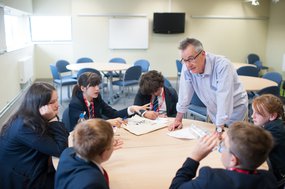
High-quality classroom talk is essential to pupils’ thinking and learning. It is also linked to improvements in reading and writing, and overall attainment.
This oracy resource for secondary school teachers covers how different types of talk, together with listening skills, can be explicitly taught and practised in the classroom to develop pupils’ oracy skills. Through structured discussions, questions to clarify, building on the contributions of others and evaluating different viewpoints, pupils can be supported to learn skills for effective speaking and listening.
The resource includes
- An explanation of the purpose and features of exploratory talk, with guidance on how to introduce oracy into the classroom through modelling, explicit teaching, prompts and open-ended questioning.
- A description of the purpose and features of dialogic talk, looking at interactions that are collective, reciprocal, cumulative and purposeful, together with advice on how to make it happen in the classroom.
- A brief summary of recent research in to oral language with references and links for further reading.
- A detailed insight into Socratic talk as an example of metacognition in practice with an analysis of what it both looks and sounds like.
- Instructions for organising a Socratic seminar in the classroom including observer prompt cards
Links to the national curriculum
This resource suitable for secondary schools links to the overarching literacy requirements for all subjects of the national curriculum for England:
Spoken language
6.2 Pupils should be taught to speak clearly and convey ideas confidently using Standard English. They should learn to justify ideas with reasons; ask questions to check understanding; develop vocabulary and build knowledge; negotiate; evaluate and build on the ideas of others; and select the appropriate register for effective communication. They should be taught to give well-structured descriptions and explanations and develop their understanding through speculating, hypothesising and exploring ideas. This will enable them to clarify their thinking as well as organise their ideas for writing.
The national curriculum in England: Key Stages 3 and 4 framework (2014), DfE.